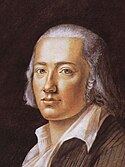Friedrich Holderlin Quote
You wanted greater thingsBut love forces all of us downAnd sorrow bows us still harder.They bend us back where we began.Are there not in the hallowed nightAlso right things?Things that are straight and true?So I learned.For never, as mortal teachers do,Have you, my deities,Upholders of all thingsLed me with cautionOn level pathways.The gods say to humans,Taste everythingAnd learn by that nourishmentTo give thanks for all thingsAnd know what it is to be free to quitAnd go where you like.
Friedrich Holderlin
You wanted greater thingsBut love forces all of us downAnd sorrow bows us still harder.They bend us back where we began.Are there not in the hallowed nightAlso right things?Things that are straight and true?So I learned.For never, as mortal teachers do,Have you, my deities,Upholders of all thingsLed me with cautionOn level pathways.The gods say to humans,Taste everythingAnd learn by that nourishmentTo give thanks for all thingsAnd know what it is to be free to quitAnd go where you like.
Related Quotes
About Friedrich Holderlin
Johann Christian Friedrich Hölderlin (UK: , US: ; German: [ˈfʁiːdʁɪç ˈhœldɐliːn] ; 20 March 1770 – 7 June 1843) was a German poet and philosopher. Described by Norbert von Hellingrath as "the most German of Germans", Hölderlin was a key figure of German Romanticism. Particularly due to his early association with and philosophical influence on Georg Wilhelm Friedrich Hegel and Friedrich Wilhelm Joseph Schelling, he was also an important thinker in the development of German Idealism.
Born in Lauffen am Neckar, Hölderlin had a childhood marked by bereavement. His mother intended for him to enter the Lutheran ministry, and he attended the Tübinger Stift, where he was friends with Hegel and Schelling. He graduated in 1793 but could not devote himself to the Christian faith, instead becoming a tutor. Two years later, he briefly attended the University of Jena, where he interacted with Johann Gottlieb Fichte and Novalis, before resuming his career as a tutor. He struggled to establish himself as a poet, and was plagued by mental illness. He was sent to a clinic in 1806 but deemed incurable and instead given lodging by a carpenter, Ernst Zimmer. He spent the final 36 years of his life in Zimmer's residence, and died in 1843 at the age of 73.
Hölderlin followed the tradition of Johann Wolfgang von Goethe and Friedrich Schiller as an admirer of Greek mythology and Ancient Greek poets such as Pindar and Sophocles, and melded Christian and Hellenic themes in his works. Martin Heidegger, upon whom Hölderlin had a great influence, said: "Hölderlin is one of our greatest, that is, most impending thinkers because he is our greatest poet."
Born in Lauffen am Neckar, Hölderlin had a childhood marked by bereavement. His mother intended for him to enter the Lutheran ministry, and he attended the Tübinger Stift, where he was friends with Hegel and Schelling. He graduated in 1793 but could not devote himself to the Christian faith, instead becoming a tutor. Two years later, he briefly attended the University of Jena, where he interacted with Johann Gottlieb Fichte and Novalis, before resuming his career as a tutor. He struggled to establish himself as a poet, and was plagued by mental illness. He was sent to a clinic in 1806 but deemed incurable and instead given lodging by a carpenter, Ernst Zimmer. He spent the final 36 years of his life in Zimmer's residence, and died in 1843 at the age of 73.
Hölderlin followed the tradition of Johann Wolfgang von Goethe and Friedrich Schiller as an admirer of Greek mythology and Ancient Greek poets such as Pindar and Sophocles, and melded Christian and Hellenic themes in his works. Martin Heidegger, upon whom Hölderlin had a great influence, said: "Hölderlin is one of our greatest, that is, most impending thinkers because he is our greatest poet."
